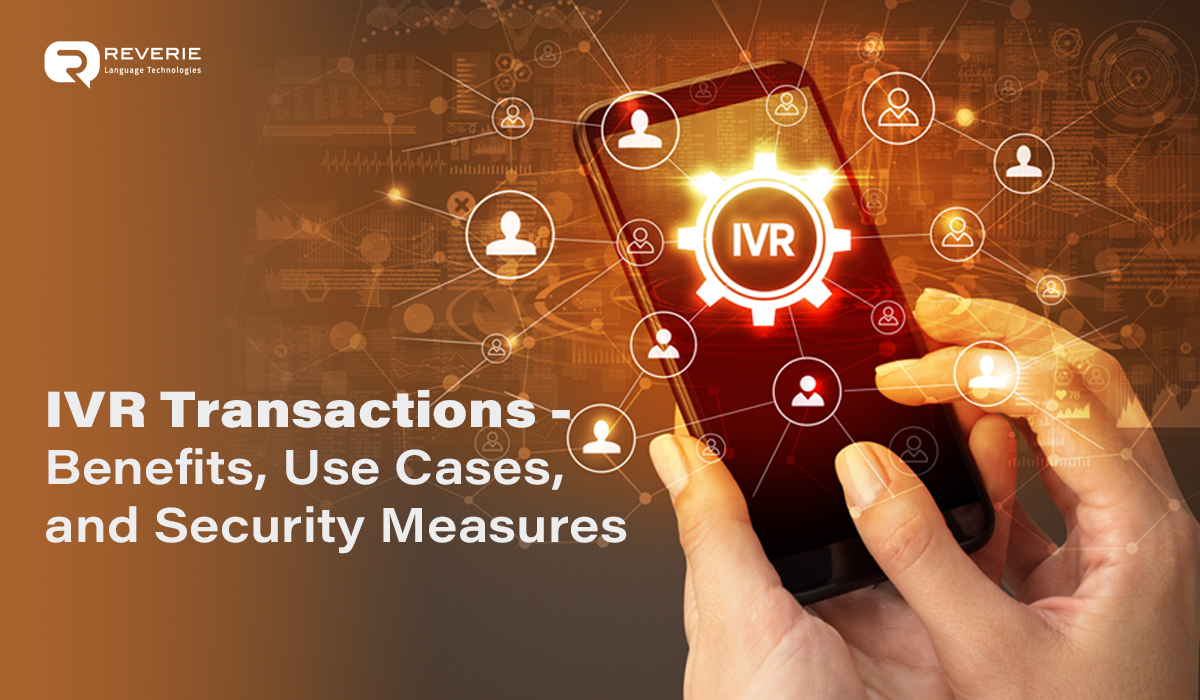Have you ever wondered how you can check your bank balance at 2 AM without talking to anyone? Or how you can quickly transfer money from one account to another with just a few taps on your phone? Welcome to the world of IVR transactions! In this blog, we’ll dive deep into what IVR transactions are, how they work, their benefits, security measures, and much more. Let’s get started!
What Are IVR Transactions?
So, what exactly are IVR transactions? IVR stands for Interactive Voice Response, and it’s a technology that allows customers to interact with a bank’s services via voice commands or keypad inputs. Instead of waiting on hold for a customer service representative, you can navigate through a menu of options and complete transactions all by yourself!
But what does IVR transaction mean in a practical sense? It means you can do things like check your balance, transfer funds, or pay your bills without needing to speak directly with a bank employee. This technology has revolutionized how we conduct our banking activities, making them faster, easier, and more accessible.
The Benefits of IVR Transactions
Let’s talk about why IVR transactions are changing the game in the banking sector.
- 24/7 Availability: Whether it’s late at night or early in the morning, you can access your bank account anytime. IVR systems are always on, so you don’t have to wait until business hours to manage your finances.
- Cost Efficiency: Banks save money by reducing the need for customer service representatives. This can lead to lower fees for customers and potentially better interest rates.
- Faster Service: No one likes to wait on hold! IVR systems allow you to get information or complete transactions quickly, significantly reducing call handling times.
- Error Reduction:
Human error can happen during transactions, but IVR systems follow a standardized process, minimizing mistakes and ensuring accuracy. - Increased Transaction Volume:
IVR systems can handle many calls simultaneously, meaning more customers can be served at once. This is especially beneficial during peak times.
Different Types of IVR Payments in Banking
Understanding the different types of IVR payments can significantly enhance customer interactions in banking. The term IVR transaction means a variety of methods through which customers can engage with their bank, while IVR payment meaning encompasses all forms of transactions facilitated via these systems. As banks continue to adopt these technologies, the potential for more efficient and secure IVR online transactions will only grow.
Interactive Voice Response (IVR) systems have revolutionised banking transactions, allowing customers to make payments efficiently and securely. Here are the main types of IVR payments commonly utilised in the banking sector:
-
Voice-Based Payments
Voice-based payments utilise advanced speech recognition technology, enabling customers to conduct transactions by speaking their requests. This method enhances the user experience by making the process more intuitive.
Example: A customer calls their bank’s IVR system and states, “I want to pay my credit card bill.” The system then guides them through the payment process using voice prompts.
-
Touch-Tone Payments
Touch-tone payments require customers to input payment information using their phone’s keypad. This method is straightforward and familiar to most users.
Example: A customer dials into an IVR system and selects options by pressing numbers on their keypad, such as entering their credit card number for payment.
-
Hybrid IVR Payments
Hybrid IVR payments combine voice and touch-tone inputs, allowing customers to choose their preferred interaction method. This flexibility accommodates varying user preferences and enhances accessibility.
Example: A customer may verbally provide their account number but switch to touch-tone input for entering their credit card details.
-
Self-Service IVR Payments
Self-service IVR payments allow customers to complete transactions independently without the need for human assistance. This method is convenient for users who prefer to manage their finances on their terms.
A self-service IVR payment enables users to make payments, check account balances, or transfer funds at any time without waiting for a representative. This type of payment system uses voice prompts to guide customers through the payment process, ensuring a smooth and efficient experience.
-
Agent-Assisted IVR Payments
In contrast to self-service options, agent-assisted IVR payments involve a customer service representative. In this scenario, the IVR system collects preliminary information from the customer before connecting them to an agent who can assist with the transaction. This IVR online transaction method is particularly useful for complex transactions that may require additional support or verification.
The following table summarises these types of IVR payment configurations:
| Type | Description |
| Voice-Based Payments | Customers request transactions verbally using speech recognition. |
| Touch-Tone Payments | Customers input information using their phone’s keypad. |
| Hybrid IVR Payments | Customers can use both voice and keypad inputs interchangeably. |
| Self-Service IVR Payments | Customers complete transactions independently using voice prompts. |
| Agent-Assisted IVR Payments | Customers receive assistance from a representative after initial input via the IVR system. |
All types of IVR payments enhance customer convenience and operational efficiency in banking.
What Are the Features and Components of the IVR System?
An effective IVR system is built on several key features and components that ensure seamless interaction between customers and banking services. Understanding these elements can improve the user experience and service delivery.
Key Features of IVR Systems:
- Automated Call Routing: Directs calls based on user input, ensuring customers reach the appropriate department quickly.
- Voice Recognition: Allows users to interact with the system using spoken commands, enhancing accessibility.
- Self-Service Options: Enables customers to perform routine tasks such as checking balances or making payments without human intervention.
- Multilingual Support: Offers services in multiple languages, catering to a diverse customer base.
- Data Integration: Connects with databases to provide real-time information about accounts and transactions.
Essential Components of an IVR System:
- Telephony Interface: Connects the IVR system to the telephone network.
- Voice Prompts: Pre-recorded messages that guide users through options.
- Menu Options: A structured set of choices presented to callers for navigation.
- Database Access: Allows real-time access to customer data for personalised interactions.
- Call Routing Logic: Determines how calls are directed based on user inputs.
These features and components work together to create an efficient and user-friendly environment that enhances customer satisfaction in banking transactions.
Common Use Cases for IVR Transactions
Now that we’ve established the benefits, let’s explore some common scenarios where IVR transactions shine:
- Balance Inquiries: Want to know how much money you have in your account? Just call the IVR number and select the balance inquiry option! It’s as simple as that.
- Fund Transfers: Need to move money between accounts? IVR makes it easy. Just follow the prompts, and your transfer is done in seconds.
- Bill Payments: You can schedule and pay bills directly through the IVR system. No more late payments or missed deadlines!
- Fraud Alerts: Banks use IVR to alert customers about suspicious transactions. You can quickly confirm or dispute the activity right over the phone.
- Account Management: Update your personal information, like your address or phone number, all through the IVR system without needing to visit a bank branch.
How IVR Transactions Work
So, how do IVR transactions actually work? It’s pretty straightforward. When you call the bank’s IVR number, you’ll hear a greeting followed by a menu of options. For example, you might hear, “Press 1 for account balance, press 2 for fund transfers.”
By following the prompts and entering your information (like your account number or PIN), you can navigate the system and complete your desired transaction. This process is incredibly user-friendly and designed to ensure you can do everything you need without a hassle.
You might be wondering, what about IVR internet transactions? Many banks integrate IVR systems with their online services, allowing you to conduct transactions both over the phone and through their websites or mobile apps. This flexibility makes banking even more convenient.
Security Measures for IVR Transactions
Security is a top concern for everyone when it comes to banking, and IVR transactions are no exception. Banks implement several measures to ensure your information is safe:
- Encryption: Data transmitted during IVR transactions is encrypted, which protects it from being intercepted.
- Authentication: You may be required to enter a PIN or answer security questions to verify your identity before completing any transactions.
- Voice Biometrics: Some advanced IVR systems use voice recognition technology to authenticate users based on their unique voice patterns, adding another layer of security.
- Regular Audits and Compliance: Financial institutions conduct regular audits to ensure their IVR systems comply with industry regulations, keeping your data secure.
- Monitoring for Anomalies: Banks monitor IVR transactions in real-time to detect any unusual patterns that may indicate fraud or unauthorized activity.
The Future of IVR Transactions
As technology continues to evolve, so will IVR transactions. Innovations like artificial intelligence and machine learning are paving the way for more advanced systems that can provide even better service.
And for those still curious about the IVR transaction full form, it stands for Interactive Voice Response transaction a testament to how technology has transformed the banking experience.
In a nutshell, IVR transactions have revolutionized the way we interact with our banks. With benefits like 24/7 availability, cost efficiency, and faster service, they provide an excellent solution for managing your finances on the go.
Reverie’s solutions enhance this experience by offering Indian Language IVRs, allowing users to engage in their preferred language. This ensures accessibility for a broader audience, promoting financial inclusion and improving customer satisfaction. With Reverie’s NLP and NLU technologies, banks can create intuitive voice interfaces that understand and respond accurately to customer queries in various Indian languages.
Whether you’re a banking professional looking to implement IVR technology or a consumer eager to take advantage of its convenience, understanding IVR transactions is essential. So, the next time you need to check your balance or transfer funds, remember: with IVR, it’s all just a phone call away!
Have you tried IVR transactions before? What was your experience like? Share your thoughts in the comments below, and let’s discuss how this technology, especially with Reverie’s Indian Language IVRs, can further enhance your banking experience!
Explore how Reverie’s Indian Language IVR solutions can benefit your organization or reach out for a demo today!
FAQs
1: What are IVR transactions?
IVR transactions refer to transactions conducted through an Interactive Voice Response (IVR) system, allowing customers to interact with their bank’s services using voice commands or keypad inputs. This technology enables users to perform tasks such as checking account balances, transferring funds, and paying bills without needing to speak to a customer service representative.
2: What does IVR transaction mean?
An IVR transaction means using an Interactive Voice Response system to conduct banking activities. It allows customers to navigate through a menu of options using their phone, enabling them to complete various banking tasks efficiently and independently.
3: What is an IVR internet transaction?
An IVR internet transaction refers to transactions conducted through an Interactive Voice Response system that is integrated with online banking services. Customers can use their phones to access banking features available on their bank’s website or mobile app, allowing for seamless management of their accounts.
4: What is the full form of IVR in banking?
The full form of IVR in banking is Interactive Voice Response. This technology enables customers to interact with their bank’s systems through voice prompts and keypad inputs, streamlining various banking processes and enhancing customer experience.
5: How does IVR work for banking transactions?
IVR works for banking transactions by allowing customers to call a designated IVR number. Upon calling, users hear a menu of options, such as checking balances or making transfers. They can navigate through these options by speaking or pressing the appropriate keys on their phone, enabling them to complete transactions quickly and efficiently without human assistance.


